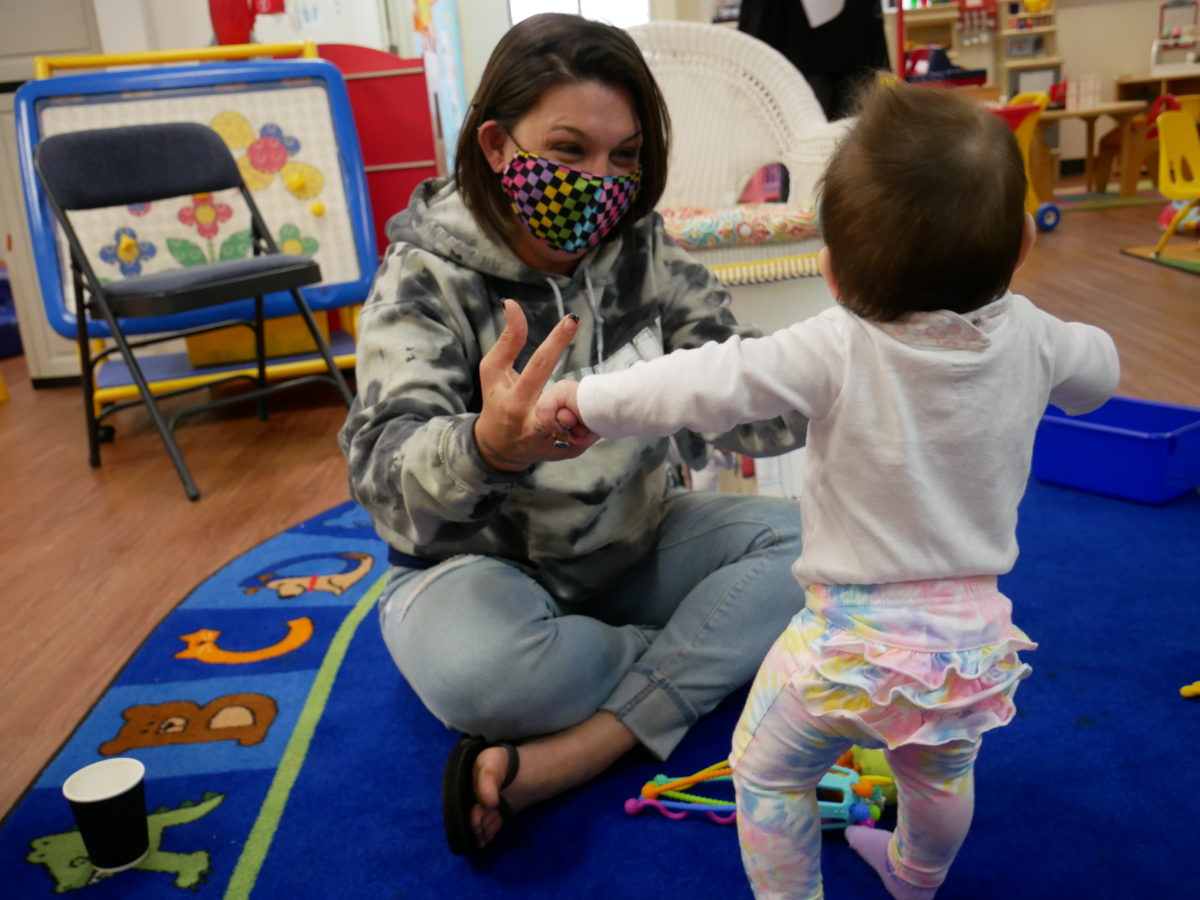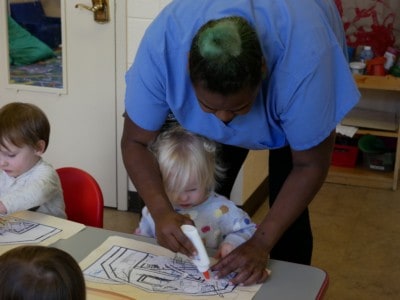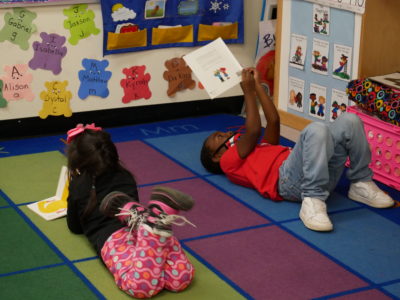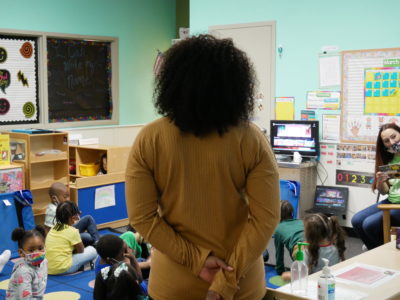

Jessica Phillips, a mom of three in Carteret County, found out her youngest child has autism in October 2019.
“I didn’t want to get out of bed after his diagnosis — it was just so hard — and then you throw the pandemic on top of that, and I’ve got three kids at home,” Phillips said. “I’ve got one autistic child, one that’s severely hyper, and then my tween who just thinks she’s too cool for everything.”
During weeks of frustrating calls to find intervention services for her son with autism, who is now 4 years old, Phillips knew she needed something for her own mental health, she said. The local health department recommended Better Beginnings, a home-based therapy program developed by and operated out of the Carteret Partnership for Children, one of 75 local Smart Start partnerships in the state.
Phillips met Glenda Self, the program’s licensed professional counselor. Self has helped her find services to meet her son’s needs — on top of supporting her through feelings of isolation and “mom guilt,” Phillips said.
“This woman has saved my life over COVID,” she said.
Tonya Gillikin, a mother of eight who has struggled with substance abuse, said getting help through Better Beginnings with her 8-month-old daughter in her home was critical. She lacked transportation at a time when she wanted to make sure she had the parenting skills to raise her daughter.
“I’ve learned a lot and continue to learn a lot,” Gillikin said. “It helps me feel like a more confident mom for sure.”
Early in the pandemic, Carteret home-based programs supported parents and children virtually, like many across the state. As they return to in-person visits, program coordinators hope to reach more families navigating trauma and an unusual year of pandemic parenting.
‘A perfect storm’
Parenting in Carteret County in recent years has meant handling the aftermath of three hurricanes — both physically and emotionally. Throw in a dwindling child care landscape and a pandemic, and you get “a perfect storm” of stress for families with young children, said Juliet Rogers, executive director of the Carteret Partnership for Children.
“In eastern North Carolina with Florence, wealthy people got new kitchens, and people who were at or below poverty level were just devastated,” Rogers said. “They are living still to this day in homes not meant for habitation.”
To meet families’ needs, Rogers has been writing grants to expand the organization’s home-based family support programs — Better Beginnings, a program aimed at preventing child abuse and neglect, and Baby Steps, a less intensive program that works to strengthen child development and school readiness. Self, the one counselor for Better Beginnings, works with 26 families across the county, sometimes driving an hour each way to participants’ homes to build positive family interactions. Twenty families are on the program’s waiting list.
“Better Beginnings has really saved people’s lives throughout this with that social connectedness, because people really are feeling isolated,” Self said. “And we know that for abuse to happen, it needs three things: it needs isolation, it needs secrecy, it needs shame.”
Depending on families’ immediate needs, Self works to get families connected with appropriate resources, and then set goals with parents. Her broader goal, she said, is to increase parents’ nurturing capacities.
“We know that the cure, the true antidote to abuse is nurturing,” she said. “They’re inversely correlated.”
Tara Willeford, who coordinates Baby Steps on top of wearing various hats at the partnership, said the county has seen “an explosion in need” for home visiting services. Whether it’s therapy for parents who were abused, to heal and break that cycle, or a simple connection to community resources, the programs provide a judgment-free zone that encourages positive outcomes for parents and children.
“No matter what your situation or your socioeconomic level is, being told you’re doing it right and, if not, ‘What do you need? What can I find for you?'” Willeford said. “That’s what keeps me going.”
“Families that I work with are overwhelmingly just so grateful to have had someone stand beside them in their journey,” she said.
Learning to care for ourselves
Better Beginnings receives referrals from hospitals, pediatricians’ offices, schools, child care centers, the local health department, and homeless shelters. Sometimes parents come to the program because their child is facing suspension from an early learning program because of behavior issues. Families must have at least one child under 5 years old and meet at least four of 26 psychological risk factors to qualify.
The factors are split into three categories — “in the child,” such as premature birth or repeated aggression, “in the family,” such as poverty or mental illness, and “experiential risk factors,” such as long-term absence of a caregiver during infancy or teen pregnancy.
“We’re the only nonprofit in Carteret County that tries to stop abuse and neglect before it gets started,” Rogers said. Partnership staff have called the program a “well-kept secret,” but Rogers is hoping to attract statewide grants. The largest current funder, Rogers said, is the Anonymous Trust. The North Carolina Partnership for Children pays $50,495 annually to cover Self’s salary and mileage.
The program currently serves nine children with special needs, like Phillips’ son.
Phillips recalled a particularly challenging time when her husband had to leave for an extended work trip. She said Self helped her reach out to friends and create a support network.
Self said her work in helping children is often about teaching parents to care for themselves.
“The bulk of my interventions is parental self-care,” Self said. “We do so much better when we learn how to care for ourselves.”
Gillikin said her biggest lesson from the program has been about healing from her own traumatic experiences.
“I started having kids really young, and I had a difficult time through growing up with them, really,” she said. “I’ve identified more where my issues started and better ways to deal with my own part of it and heal myself so I can be more healthy for her … That’s been a huge ‘aha’ for me in the whole program, is being able to identify my issues and the root of them so I can correct that and break the cycle for her.”
The potential reach
Home visiting programs — which have a variety of focal points but tend to focus on increasing bonds between parents and children — reach about 1% of families who could benefit from evidence-based programs in North Carolina, according to a 2018 report from the Jordan Institute for Families at UNC-Chapel Hill. Researchers, advocates, and philanthropists have been working to increase awareness of the benefits and investment to reach more families.
The Jordan Institute also released a statewide needs assessment in 2020, including a county risk assessment that ranks the highest priority counties for home visiting expansion based on socioeconomic status, adverse perinatal outcomes, substance use disorder, crime, and child maltreatment. Carteret County falls in the middle of that risk level.
In the coming months, Willeford said, a new grant will pay for another therapist to add to Self’s team and reach more families, especially in “isolated pockets of the community.”
She said she thinks home visiting is particularly important in rural areas of the state that lack economic opportunities for families. Often those with the biggest need, Willeford and Self said, do not have access to programs due to geography, transportation issues, and funding.
“Carteret County is 100 miles long. That often presents challenges in (Self) being able to take on a family,” Willeford said.
The potential need of the program is undetermined, she said. She knows 40% of children in the county live in low-income homes, but doesn’t know what percentage would qualify. She said she thinks it will take more time to see how difficulties of the last year show up in families’ lives.
“As the pandemic gets better —so to speak — for rural counties, for counties that were hit hard, it’s going to even take another year to see the big impacts on families,” Willeford said. “There’s going to be different things within counties, especially in rural counties where you do have a lot of poverty to begin with; that’s going to come into play.”







